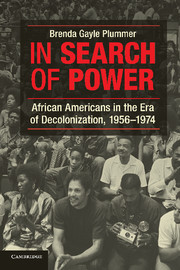Book contents
- Frontmatter
- Contents
- Figures
- Introduction
- 1 A Great Restlessness
- 2 Peace or a Sword?
- 3 “Freedom’s Struggle Crosses Oceans and Mountains”
- 4 Meeting Odinga
- 5 When Race Doesn’t Matter
- 6 Embracing the Globe
- 7 Race, Space, and Displacement
- 8 Africa and Liberation
- 9 Agenda Setting on Two Continents
- Conclusion
- Bibliography
- Index
- References
9 - Agenda Setting on Two Continents
Published online by Cambridge University Press: 05 December 2012
- Frontmatter
- Contents
- Figures
- Introduction
- 1 A Great Restlessness
- 2 Peace or a Sword?
- 3 “Freedom’s Struggle Crosses Oceans and Mountains”
- 4 Meeting Odinga
- 5 When Race Doesn’t Matter
- 6 Embracing the Globe
- 7 Race, Space, and Displacement
- 8 Africa and Liberation
- 9 Agenda Setting on Two Continents
- Conclusion
- Bibliography
- Index
- References
Summary
One day in autumn 1967, Dr. Donald Gatch, a white physician practicing in rural Beaufort County, South Carolina, smuggled a nine-year-old black girl into an operating theater. It was against the rules of his facility to perform surgery on indigent patients, so the operation, an appendectomy, was done surreptitiously. Once the child was on the table, the surgical team discovered that she had rickets. When they opened her abdomen, they found her riddled with worms. “These colored children don’t have much to eat,” a colleague observed, and when they did receive some nourishment, worms got to it first. Gatch tried but failed to secure funds from the local health department to remedy the widespread sickness and malnutrition. He had no better luck with foundations. The Rockefeller Foundation, whose hookworm program during the 1940s had been highly successful, now only addressed nutrition overseas. The National Institutes of Health worked only through universities.
The Nebraska-born Gatch faced reprisal from area whites for embarrassing the state when the real issues, they thought, were the dirtiness and improvidence of blacks. Other local physicians publicly denied his claims, and white patients deserted his uncharacteristically integrated waiting room. Gatch was brought up on drug abuse charges and faced the loss of his license. Mississippi representative Jamie Whitten, chair of the House Agriculture Appropriations Committee, asked the FBI to investigate him. South Carolina’s governor, fearing the impact of the doctor’s revelations on investment and tourism, condemned him. Gatch eventually left the state.
- Type
- Chapter
- Information
- In Search of PowerAfrican Americans in the Era of Decolonization, 1956–1974, pp. 307 - 342Publisher: Cambridge University PressPrint publication year: 2012

